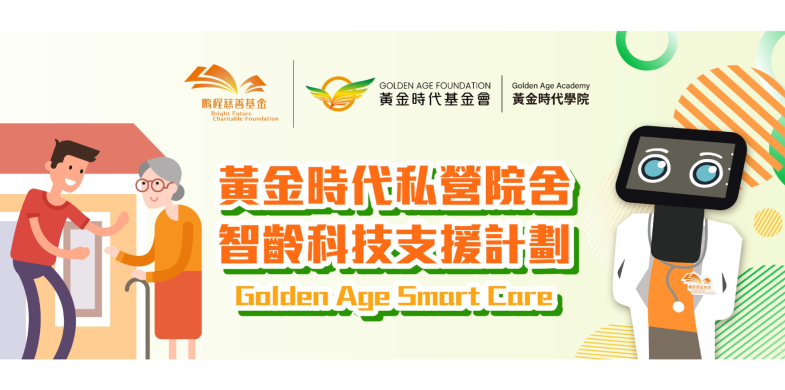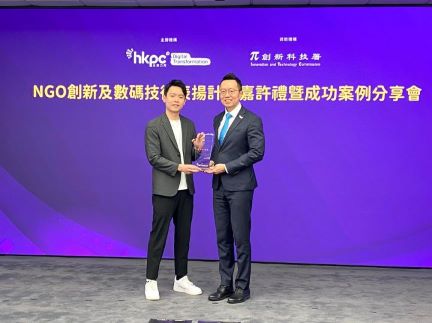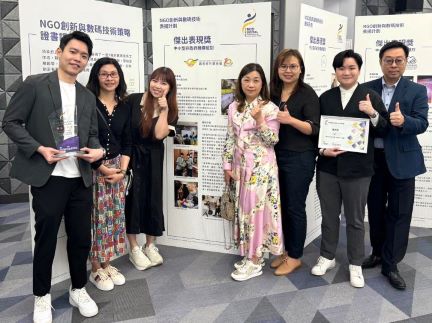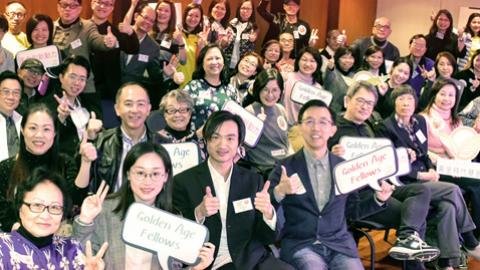
Project introduction
Golden Age Foundation has launched the second phase of the "Smart Care Lab" project in November 2022 - the Golden Age Smart Care Project for four private nursing homes, which provide deeper and broader support, focus on the use of appropriate smart ageing technologies, and further break the technology gap.
This project was funded by the Bright Future Charitable Foundation, focuses on assisting private nursing homes and enables them to implement appropriate smart ageing technologies through continuous evaluation, review and modification. In addition, the plan has established a set of training programs and platforms for smart ageing technology application suitable for private nursing homes to help develop a sustainable and systematic plan for the use of smart ageing technology.
Project content
1. Implement smart ageing technology applications
|
Image

|
Intelligent age robot "Dr. Golden": It patrols places according to routes at designated times every day. At the same time, it can spray disinfectants to disinfect the institutions. It can also play short videos and music, conduct simple health management with medical testing equipment, and conduct video calls. |
|
Image

|
Companion doll "Golden Baby": This is a simulated baby with an Asian face that can blink, make sucking, burping and laughing sounds. It is a doll therapy specially designed for the elderly with moderate or severe cognitive impairment. |
|
Image

|
Cognitive training and dementia assessment apps: It uses an interesting and interactive game method to collect, record and analyse player data using artificial intelligence to help patients with dementia monitor their condition in the game and detect and prevent dementia early. |
|
Image

|
Fall detection systems: After evaluation by the project nurse, fall detection devices are installed in high-risk areas to keep track of residents’ fall information. |
2. Cross-generational volunteer collaboration
The project recruited and trained 20 golden agers (referring to those over 45 years old) to become "Golden Buddies" and 37 primary and secondary school students to become "Dr. Gold Junior" to jointly support the trial implementation of smart ageing technology in institutions. The social workers of the project provide them with volunteer training and encourage them to use inter-generational collaboration to plan activities for the elderly in the nursing homes, using smart ageing technology to enhance the cognitive and social skills of the residents.


3. Talent training
The project also specially designed an "internship program" that allows 24 nursing students from Caritas College of Higher Education to conduct a one-month internship in the nursing homes. During their internship, students are paired with senior nurses to gain valuable experience and professional guidance. Through interactions with residents, they can think about and understand elderly care services from multiple perspectives, and learn people-centred application methods of smart ageing technology.
In addition, the program also trained 120 practitioners from other nursing homes or elderly care institutions to understand smart ageing technology, allowing them to master the optimised work processes of the workplaces. The success of this program can be replicated in more nursing homes, and improve the quality of private nursing homes in the long term.
Awards and Recognitions
The project received the Outstanding Performance Award from the "NGO Innovation and Digital Technology Recognition Scheme" (NGO創新及數碼技術表揚計劃) by the Hong Kong Productivity Council.




